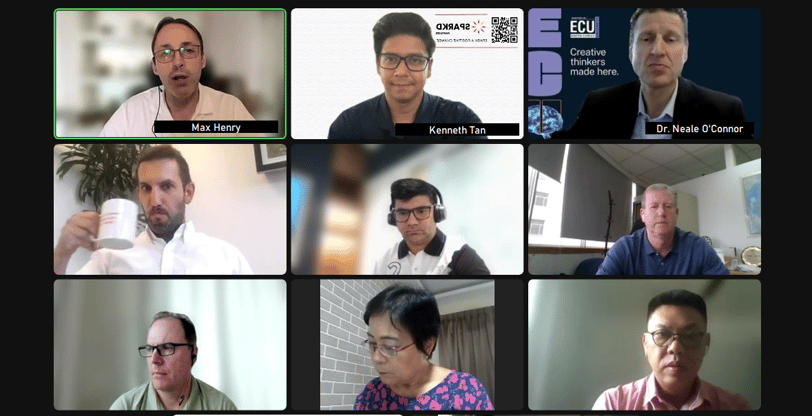Global Sourcing Roundtable (Jun 2023)
In an interactive session hosted by Global Supply Chain Council, Kenneth Tan joins Dr. Neale O'Connor in discussing recent supply chain observations of global companies making moves to decentralize their supply chains from China.


Max Henry, Kenneth Tan, and Dr. Neale O'Connor as panelists on the Global Supply Chain Council's Roundtable session.
On 15 Jun 2023, SPARKD Partner's Founder, Kenneth Tan co-hosted a Global Sourcing Roundtable organized by Global Supply Chain Council. It was an engaging and interactive session attended by industry leaders and supply chain professionals. The Roundtable format allowed for panellists to freely exchange knowledge, share ideas, and discuss current challenges.
The key themes for this Roundtable Session revolved around the large decentralization of supply chains from China. Dr. Neale O'Connor, who was also hosting the Roundtable, had recently published a report with PBEC & KPMG, which showed trends of global companies who had diversified their supply bases outside of China.
One of the key takeaways from Dr Neale's research was how the "China Plus One" trend could be more accurately described as the "China Plus 2 or 3" trend. The research showed that global businesses have been working on diversifying their supply chains to be less reliant on China as their single source of supply. These companies aren't exiting China completely though – instead, they're opting to expand their supply bases to one or more countries outside of China, while scaling down on their Chinese operations.
PROS:
Diversification of supply chain, lower supply chain risks
Potential to strengthen supplier relationships through collaboration & guidance
Fosters long-term strategic supplier relationships
CONS:
More complex supply chains – regulatory, quality & labour considerations
SMEs are limited from making these moves due to resource intensive nature
Complexity of manufacturing takes a long time to build – raw material quality, manufacturing processes and final product quality control
In moving away from China, Vietnam is seen as an attractive alternative. The data showed that majority of the company moves away from China have been towards Vietnam, particularly in the industrial/ electronics sectors for North Vietnam, and apparel and shoes for South Vietnam. However, participants and panelists were quick to agree that the size of the market is an important consideration. While Vietnam is developing and has great potential, Vietnam is not China. The size of Vietnam's economy is only a fraction of China's, and its existing manufacturing capabilities are not as robust. It will take time to build up Vietnam's capabilities to the point where it could even compete with China.
The discussion then steered towards apparel manufacturing. Participants pointed out that the overall consensus for quality apparel manufacturing also lies with Vietnam. This was shared while recognizing the fact that India, Indonesia, and Thailand are also hotspots for textile manufacturing sites, although the product quality varies. A lot of emphasis was also placed on the ESG and labour laws surrounding work in Bangladesh & Pakistan, which is something companies have to take note of when considering making transitions to lesser developed economies.
Another discussion point was of labour costs in relation to minimum wages. However it was noted that labour costs ends up being a small proportion of the final product cost as the cost of raw materials are typically more significant.
During the short 1-hour session, apparel manufacturing was the topic that came up as an example. However, the trends you observe in your industry may be highly sector-specific. While the general trend of manufacturing sites shifting away from China will not be a sudden change, it seems likely that more companies will be shifting their focus outside of China for the next few years at least. Overall, whether you're thinking of expanding out of China or not, we recommend thinking about the overall strategy of the product. Consider the labour cost, raw material cost, go-to-market strategy, market capabilities and customer requirements before making the move.
Hosted by Max Henry, Founder & Executive Director of Global Supply Chain Council (GSCC), Dr. Neale O'Connor, esteemed Professor from Edith Cowan University, and Kenneth Tan, Founder & Managing Director of SPARKD Partners. The next session will likely be held in August 2023 – visit GSCC's website for more exciting events!


